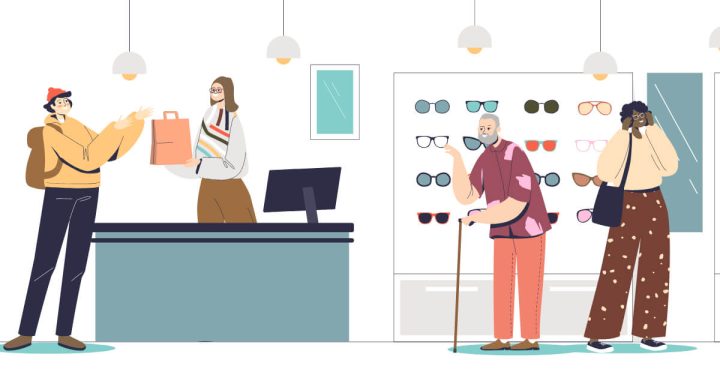
GREECE: Research on consumer attitudes considering purchases of optical products
Key research points
820 people over the age of 17 who reside permanently in Greece participated. The research was based on the points below:
(A) General questions
• More common diseases
• Use of glasses
• Use of contact lenses
• Laser surgery
• Differences between an optician and an optometrist
(B) Buying behavior
• Intention to purchase glasses from various points
(e.g. optical stores, electronics shops, pharmacies)
• Criteria for choosing glasses
• Sunglasses and children
Among those who replied that they have some eye condition:
1. About 4 out of 10 respondents answered that they have two pairs of eyeglasses.
2. About 7 out of 10 young people aged 27-34 say they have a pair of glasses while about 5 out of 10 over the age of 55 have two pairs of eyeglasses. About 4 out of 10 over 55s have three pairs of eyeglasses.
3. About 4 out of 10 respondents answered that they wear special glasses or lenses with a special coating to protect their eyes from the screens of computers, TVs, etc.; Young people choose special glasses more frequently than older people.
4. 4 out of 10 answered that, when their myopia increases, they prefer to change both lenses and the frames.
5. A percentage of 18% of men said they do nothing if the increase does not cause problems while only 7% of women replied not taking any action if the change is not inconvenient. Similarly, younger people prefer, to a greater extent than older people, not to change neither lens nor frames.
6. About 8 out of 10 respondents said they do not wear contact lenses
7. Ages between 17-34 choose to a greater extent to wear contact lenses and more specifically monthly ones comparing to older people.
8. About 6 out of 10 answered that the quality of lenses is one of the two most important criteria based on which they choose eyeglasses. About 3 out of 10 replied that the most important criteria is their style while 3 out of 10 mentioned the cost as one of the two criteria that shape their choices.
9. Men seem to be more interested in the quality of the lenses and the material of the frames in relation to the women who seem to care more about the weight of the frames, the style and the cost.
10. The vast majority are very/quite likely to buy eyeglasses from a physical optical shop while about 3 out of 10 responded that they are very/quite likely to buy eyeglasses from a pharmacy. Options such as the kiosks and the online stores are not particularly popular.
More generally, based on the total sample and not only those who replied that they have some eye condition:
11. About 7 out of 10 who have sunglasses answered that the quality of the lenses is one of the two main criteria based on which they choose sunglasses. About 5 out of 10 replied that their style is an important factor while respectively 3 out of 10 mentioned the cost as one of the two criteria that shape their choices in the case of sunglasses as well.
12. Almost 6 out of 10 replied that they think it is not at all possible/not very likely to need eyeglasses again after having laser surgery on the eyes.
13. About 5 out of 10 answered that the optometrist is not the same as the optician while about 4 out of 10 replied that they agree with the suggestion that the optometrist is an autonomous profession licensed by the Ministry of Health. Also, 5 out of 10 respondents agree that the ophthalmologist is also an optometrist.
14. 7 out of 10 respondents replied that one of the two actions they take before buying sunglasses or eyeglasses, is to visit the optics store and to discuss with the optician/optometrist. About 3 out of 10 answered that they ask their ophthalmologist and about 3 out of 10 that one of the first two actions concerning their buying behavior is to do a price comparison.
15. More specifically, about 4 out of 10 respondents aged between 17 and 34 years do a price comparison before buying eyeglasses or sunglasses, while respectively 3 out of 10 between the ages of 35 to 54 and only 2.5 out of 10 over the age of 55 do the same thing.
16. Also, about 6 out of 10 aged 17-34 visit the store before buying and discuss with experts while at older ages, this action is carried out by 7 out of 10 respondents aged between 35-54 and about 8 out of 10 aged over 55 years old.
17. People who have sunglasses and belong to the age groups from 35 years old and above, consider wearing sunglasses as mainly a matter of eye health and less of a fashion/appearance matter compared to people who belong to the age group of 17 to 34 years old.
18. About 6 out of 10 answered that a child should wear sunglasses from the age of 2.
19. In particular, 7 out of 10 women answered that a child should wear sunglasses from the age of 2 while about 5 out of 10 men support this view.
20. In addition, only 6 out of 10 of those who answered that they have a child under the age of 10, have visited an ophthalmologist for a preventive medical examination of their child or children.




